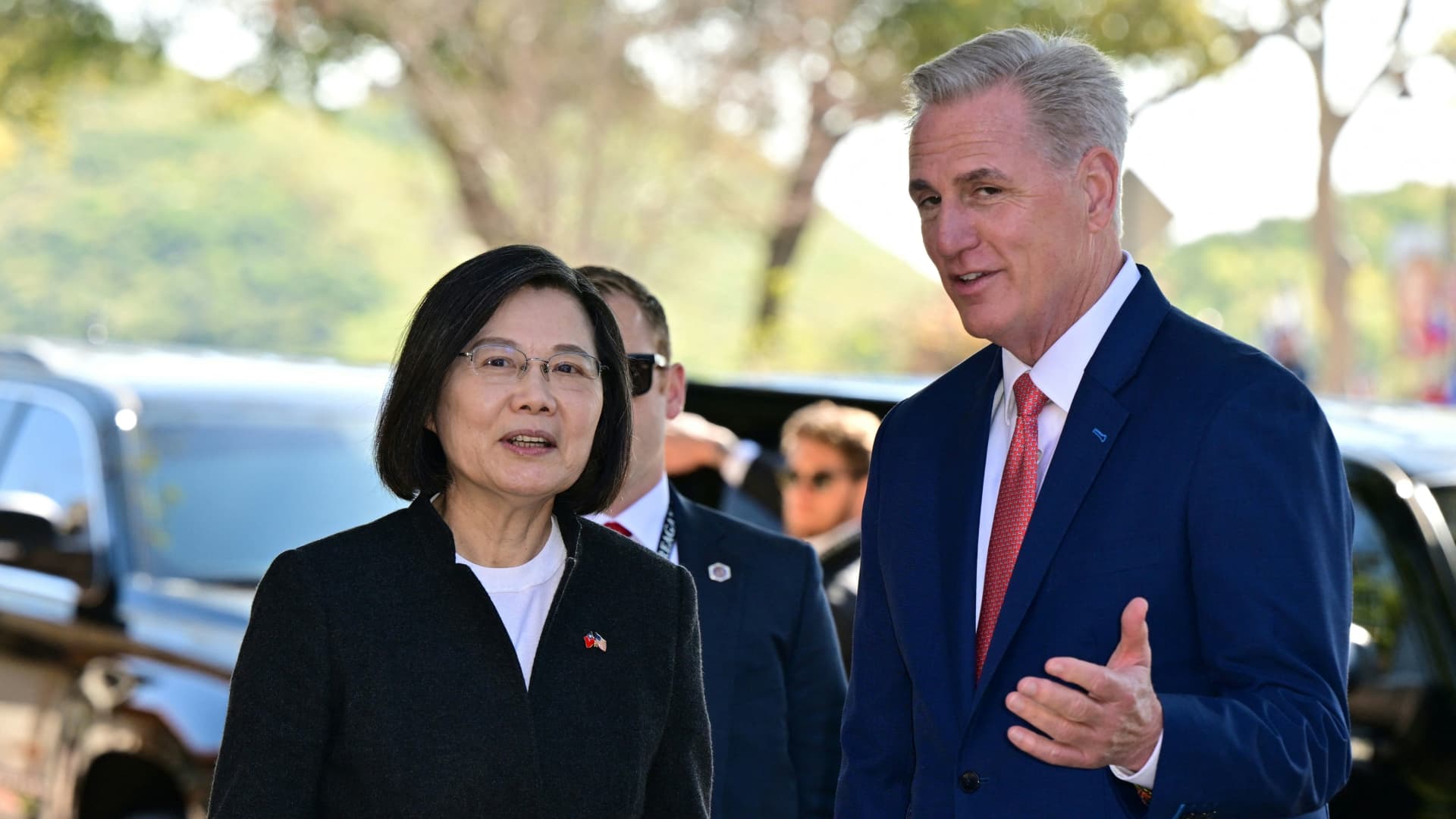House Speaker Kevin McCarthy and a bipartisan congressional delegation met Wednesday with Taiwanese President Tsai Ing-wen in Simi Valley, California, in a move that has increased simmering U.S. tensions with China.
Calling Tsai, “a great friend to America,” the Republican House speaker said they would “find ways for the people of American and Taiwan to work together to promote economic freedom, democracy, peace and stability in Asia.”
Taiwan is a self-ruling democracy, but China views Taiwan as a province of the Chinese mainland. Beijing considers any attempt by Taiwan’s leaders to act independently of Beijing as a threat to Chinese sovereignty.
Neither McCarthy nor Tsai mentioned China by name at a joint appearance, but the looming threat from Beijing was never far away.
“Today, the peace we have maintained and the democracy which we have worked hard to build are facing unprecedented challenges,” said Tsai.
She thanked members of Congress for “enhancing Taiwan’s self defense capabilities,” a reference to the billions of dollars in annual U.S. arms sales to Taiwan that receive congressional approval.
Speaking later at a solo press conference, McCarthy said the United States should speed up its arms deliveries to Taiwan.
He compared the island territory to Ukraine, which has spent the past year defending against a brutal Russian invasion. If the United States had delivered more weapons to Ukraine over the past decade, McCarthy said, perhaps that would have changed Moscow’s calculus.
Tsai’s meeting with McCarthy followed private meetings she held last week with small groups of U.S. lawmakers. On Friday, she met with three members of the Senate Armed Services Committee in New York City: Sens. Dan Sullivan, R-Alaska, Joni Ernst, R-Iowa, and Mark Kelly, D-Ariz.
Also on Friday, Tsai met with House Minority Leader Rep. Hakeem Jeffries in his home state of New York.
Unlike those low-key meetings, however, McCarthy’s afternoon of scheduled events with Tsai included a group of House members and featured several joint appearances covered by the international media.
Even portions of Wednesday’s meetings that were billed as private became public when McCarthy tweeted a photo of him and Tsai speaking one-on-one.
The meeting infuriated China’s Communist Party leadership and prompted veiled threats from Beijing to members of Congress who attended the events. China’s government said it planned to take “resolute actions” to respond to the “provocation.”
In Los Angeles, the Chinese Consulate on Monday warned McCarthy not to “repeat disastrous past mistakes and further damage Sino-U.S. relations.” The consulate was referring to a visit by then-House Speaker Nancy Pelosi, D-Calif. to Taiwan last August.
That visit prompted furious condemnation from Beijing, which launched live-fire Chinese military drills in the Taiwan Strait, just hours after Pelosi had departed the self-ruling island.
In a statement Wednesday, Pelosi said the McCarthy-Tsai meeting “is to be commended for its leadership, its bipartisan participation and its distinguished and historic venue.”
Tsai’s weeklong trip to the United States is technically unofficial, and is referred to as a “transit,” rather than a visit. But in reality, Tsai’s packed schedule of high-level meetings with U.S. lawmakers would rival that of any official visit by a world leader.
The trip added a new strain to the already fragile U.S.-China relationship, which has been weakened in recent years by Beijing’s territorial expansion in the South China Sea and its aggressive effort to control Taiwan.
In February, a Chinese reconnaissance balloon flying over the United States sparked a public outcry, until it was shot down by American fighter jets off the East Coast.
The following month, a U.S. ban on government devices using the social media app TikTok, which is owned by China’s ByteDance, drew an angry rebuke from Beijing.
